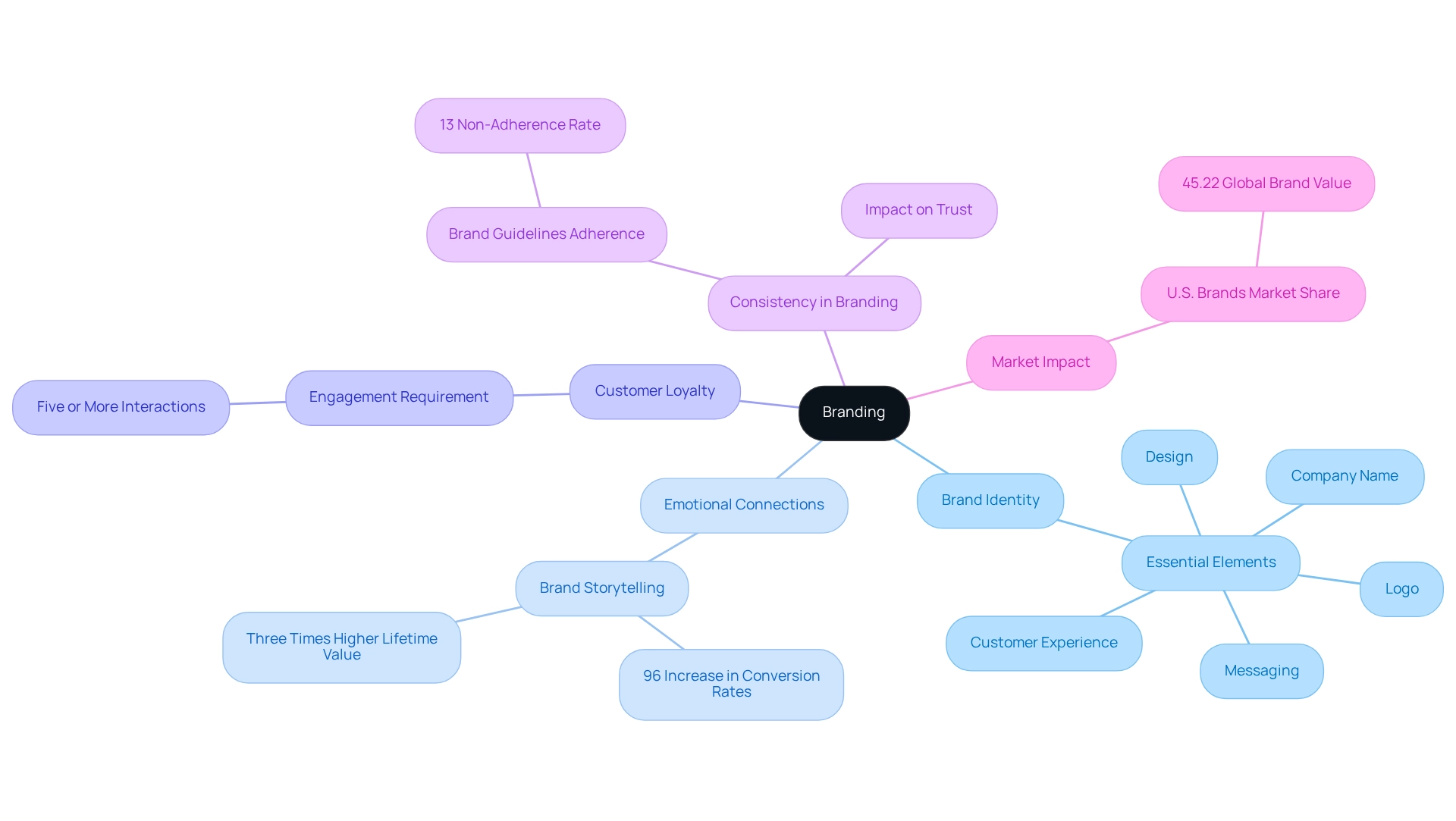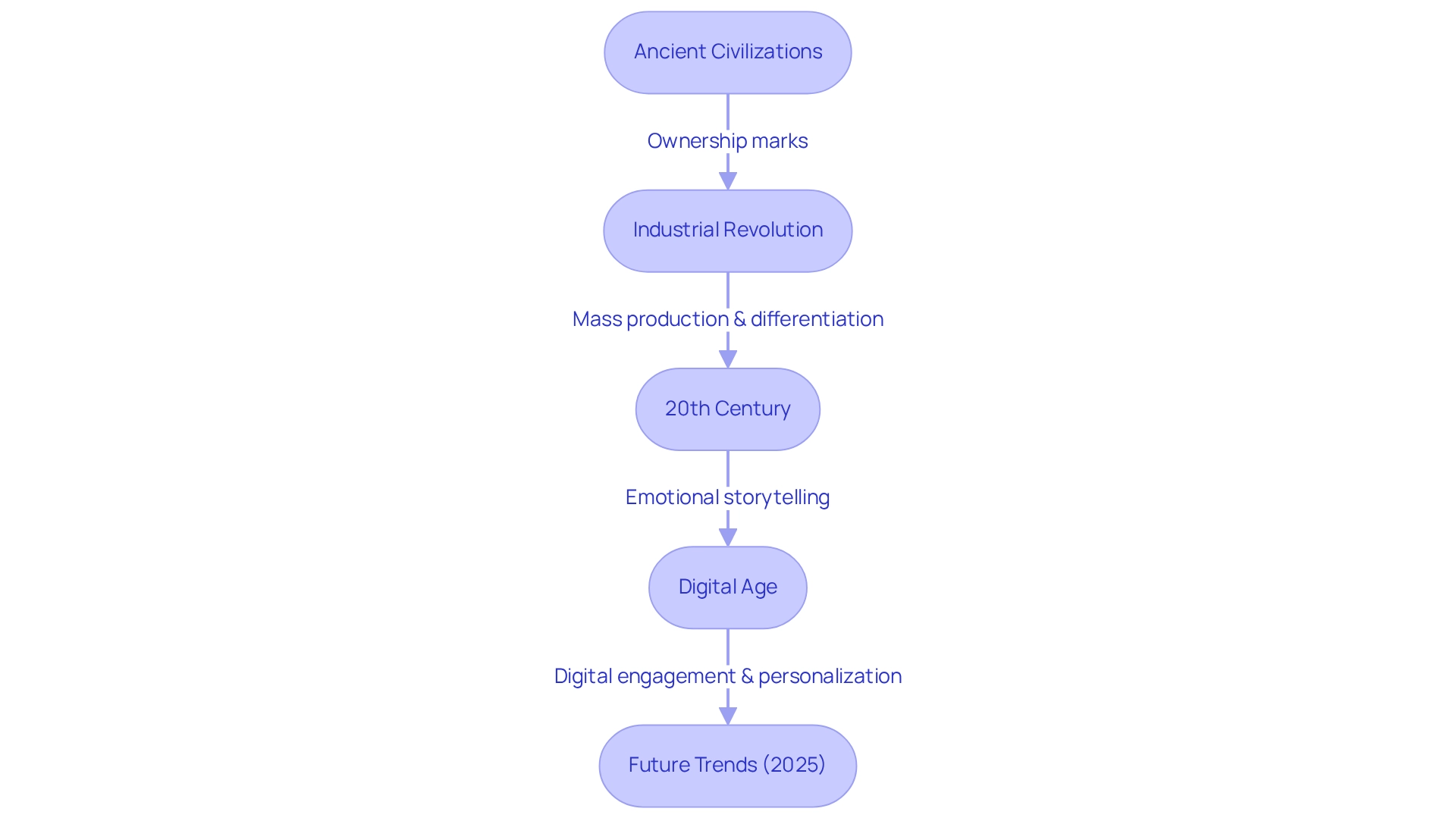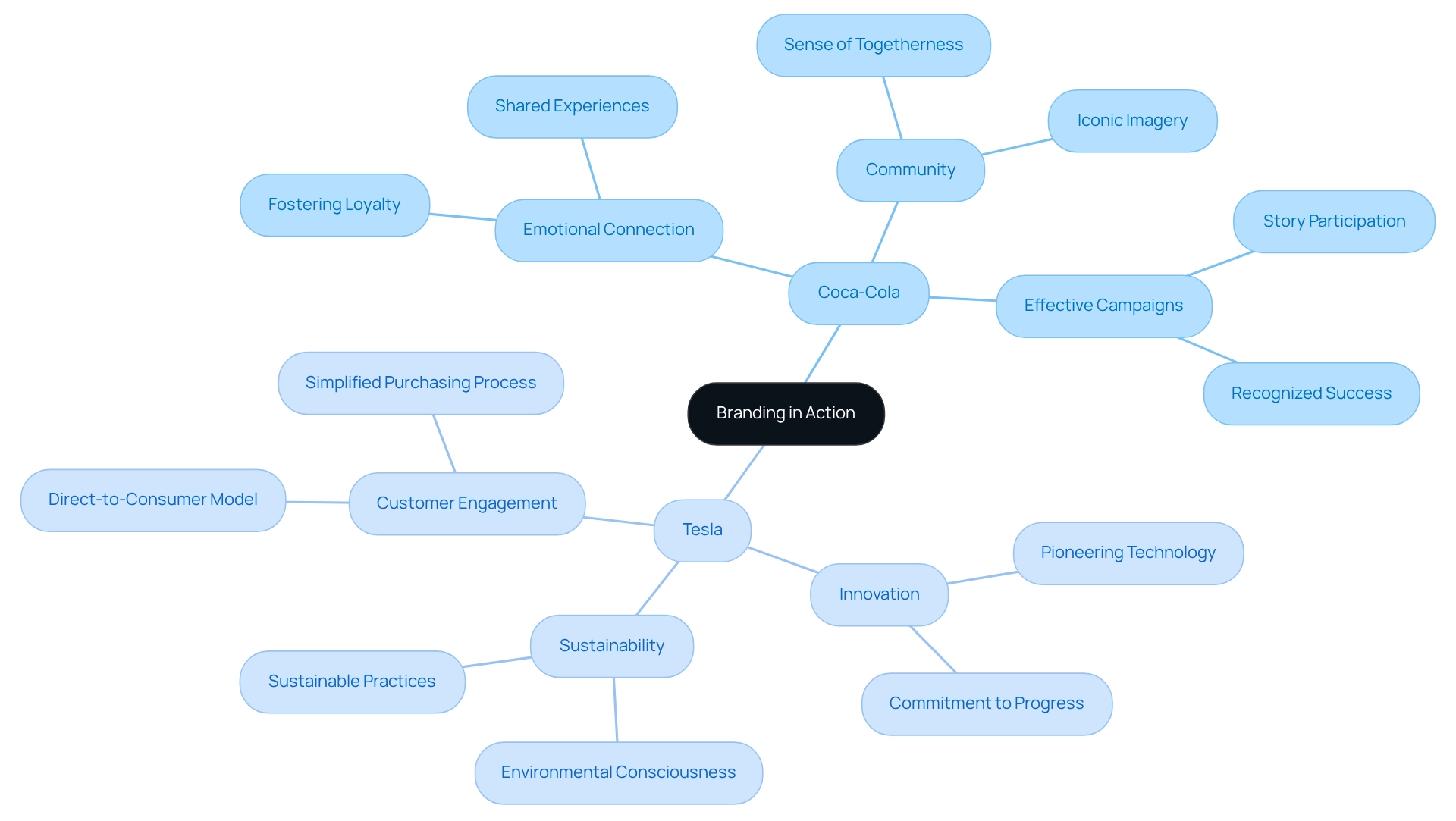Overview
In today's competitive market, many companies face the challenge of establishing a strong brand identity. This struggle can lead to a lack of customer trust and loyalty, which are essential for sustainable success.
The evolution of branding is not just a historical journey; it is a vital component that impacts how consumers connect emotionally with a brand. Companies like Coca-Cola and Tesla exemplify how effective branding strategies can foster these connections, ultimately leading to growth and engagement.
By understanding the emotional ties that consumers form, businesses can navigate the complexities of branding and build trust. Embracing this journey together can transform challenges into opportunities for lasting relationships with customers.
Introduction
In a world where consumers often feel overwhelmed by choices, branding emerges as a powerful ally that shapes perceptions and nurtures loyalty. At its heart, branding is the art of crafting a unique identity that sets a product, service, or company apart from its competitors.
As businesses navigate an increasingly crowded market, the significance of establishing a strong brand presence becomes even more crucial. Emotional connections play a vital role in consumer decisions, making effective branding strategies essential for building trust and fostering long-term relationships.
Through the lens of historical evolution and modern digital adaptations, we will explore the key characteristics of successful branding, sharing personal stories and real-world examples that highlight its profound impact on market success. Together, we can uncover how thoughtful branding can transform challenges into opportunities for connection and growth.
Define Branding: Core Concepts and Significance
For many tech startup founders, navigating the world of branding presents a significant challenge. Establishing a distinctive identity for a product, service, or company is essential in the world of branding, particularly in a competitive landscape. This identity encompasses vital elements such as the company name, logo, design, messaging, and overall customer experience. In 2025, effective marketing has become more critical than ever; it not only helps businesses stand out in a crowded market but also builds trust and loyalty among consumers. Research indicates that customers often need to engage with a brand five or more times before they consider themselves loyal. This underscores the necessity of consistent promotional efforts to nurture these vital connections in the world of branding, where the significance of identity in marketing strategy cannot be overstated. Currently, U.S. companies hold a 45.22% share of global market value, highlighting the competitive advantage that strong marketing provides.
Experts assert that in the world of branding, brand identity plays a crucial role in shaping buyer perceptions, which directly influences purchasing decisions. For instance, emotional connections fostered through storytelling can lead to an impressive 96% increase in conversion rates, with customers exhibiting three times greater lifetime value when they feel a strong emotional connection to a brand. This illustrates how effective branding in the world of branding not only attracts clients but also retains them, ultimately facilitating sustainable growth. Moreover, in the world of branding, trust and loyalty among customers are profoundly impacted. Alarmingly, 13% of companies fail to adhere to their branding guidelines, risking dilution of their identity and undermining client trust. This inconsistency can breed skepticism among consumers, making it imperative for companies to maintain a cohesive and compelling identity. Conversely, businesses that maintain in the world of branding are more likely to foster enduring relationships with their customers. Successful examples in eCommerce reveal that a clearly defined identity not only draws customers in but also retains them, promoting long-term growth.
At RNO1, we truly understand the power of strategic partnerships and innovative identity solutions. Our collaborations with industry leaders like Microsoft and Airbnb empower us to redefine digital experiences and drive growth. Take our partnership with RentMethod, which was acquired by Airbnb; it exemplifies how we can disrupt markets through impactful marketing. By focusing on design-oriented strategies, including our Return On Design & Digital (RODD) approach, we help contemporary businesses thrive in the digital landscape. Ultimately, in the world of branding, brand identity plays a crucial role in a marketing strategy that significantly influences customer trust and loyalty. This makes it essential for tech startups and enterprises aiming to succeed in today's rapidly evolving environment.

Explore the Evolution of Branding: Historical Context and Adaptation
Branding has a rich history, beginning in ancient civilizations where simple marks indicated ownership of livestock. As societies evolved, the need for differentiation became increasingly important, especially during the Industrial Revolution. This period marked a significant transformation as mass production necessitated that products stand out in a crowded marketplace. Businesses began to implement marketing strategies that not only distinguished their offerings but also nurtured emotional connections with customers, laying the groundwork for loyalty.
The 20th century ushered in a new era of advertising and marketing, where companies harnessed the power of emotional storytelling to forge connections with their audiences. This shift was pivotal, transforming brand identity from mere recognition into a multifaceted relationship between purchasers and brands. Looking ahead to 2025, it's expected that the average person will own at least six internet-connected devices, complicating the market landscape and demanding innovative strategies to capture consumer attention.
In our digital age, branding has undergone yet another transformation. The rise of social media has reshaped how companies engage with their audiences, with posts featuring images generating 650% higher engagement than text-only posts. Additionally, 53% of Americans who interact with brands on social media demonstrate increased loyalty, highlighting the importance of maintaining an active and engaging online presence. This trend underscores the necessity for companies to adapt their approaches regularly, ensuring they resonate with their target audiences in an ever-evolving digital environment.
RNO1's strategic rebranding of Founder's Haven exemplifies this adaptation, empowering modern founders to navigate the complexities of digital identity. Through creative initiatives like the Ryde program, RNO1 has expanded omnichannel ambassador efforts, enhancing e-commerce engagement through influencer collaborations. Personalization has emerged as a vital aspect of contemporary branding strategies. Consumers increasingly seek tailored experiences, and companies that provide personalized content are more likely to cultivate engagement and loyalty. A case study titled " reveals that individuals are more inclined to engage with brands that offer personalized experiences, emphasizing the importance of this approach. Furthermore, a signature color can boost the likelihood of consumers recognizing a brand by 80%, illustrating how strategic elements can enhance consumer connection.
As brand development continues to evolve, understanding its historical context and the influence of digital technologies will be essential for companies striving to thrive in the world of branding within today's competitive landscape. Together, we can navigate these changes and foster deeper connections with our audiences.

Identify Key Characteristics of Successful Branding Strategies
In today’s fast-paced marketplace, many companies struggle with effective branding strategies in the world of branding. The challenge lies in ensuring clarity, consistency, and emotional resonance in their messaging. With 64% of individuals expecting immediate responses from organizations on social media, the pressure to communicate effectively can feel overwhelming. This expectation underscores the vital need for brands in the world of branding to convey their messages clearly and consistently across all platforms. When they do, they strengthen their brand identity and create a unified experience that customers can trust. Moreover, emotional resonance plays a crucial role in the world of branding by connecting with customers on a deeper level, which nurtures loyalty and advocacy. Brands that resonate emotionally often embody a strong purpose that aligns with their audience's values, fostering a sense of community and shared identity.
Take, for instance, beloved companies like Apple and Nike. Their clear messaging and compelling storytelling evoke strong emotional responses, illustrating the power of effective branding in the world of branding. In 2023, as Gen Z represents 40% of all buyers, they increasingly seek interactive and engaging shopping experiences. This highlights the importance of emotional connection in brand identity. Additionally, a recent study revealed that 74% of marketers utilized AI for customer segmentation, with 99% acknowledging the potential of automation to enhance their brand management. This shift toward AI-driven strategies emphasizes the need for companies in the world of branding to maintain clarity and consistency while adapting to technological advancements. Experts emphasize that effective marketing methods must forge emotional connections with consumers, as this relationship is essential for lasting loyalty.
RNO1’s commitment to achieving measurable success through collaborative approaches reflects the importance of these traits. By focusing on creative strategies, such as expanding via RNO1’s Ryde initiative, companies can enhance e-commerce engagement and foster community involvement. The Ryde initiative specifically aims to create engaging experiences that resonate with consumers, driving loyalty and advocacy for the brand. Collaborating with marketing specialists can provide valuable insights for managing reputation perception, further enhancing clarity and consistency in promotional strategies. By concentrating on these essential characteristics, brands can navigate the complexities of the modern marketplace with care and build enduring relationships with their audiences.
Examine Real-World Examples: Branding in Action
In today's competitive landscape, many companies grapple with the challenge of creating impactful marketing strategies that resonate with their audiences in the world of branding. Real-world examples of successful marketing illuminate this journey, particularly through the experiences of companies like Coca-Cola and Tesla.
Coca-Cola's branding strategy is beautifully centered on evoking feelings of happiness and togetherness. By employing consistent messaging and iconic imagery, they nurture a sense of community around shared experiences. Their successful campaigns connect emotionally with customers, fostering loyalty to the brand. As Kacey Grant aptly summarizes, "It’s not just about drinking a Coke; it’s about participating in a story."
On the other hand, Tesla has carved out its identity through the principles of innovation and sustainability, appealing to those who are environmentally conscious. Their direct-to-consumer sales model simplifies , enhancing customer engagement and loyalty. This approach mirrors Coca-Cola's success in establishing emotional connections, as both companies resonate deeply with their audiences through their unique identities. Statistics reveal that Tesla enjoys a notably high reputation among consumers, with many viewing it as a leader in sustainable technology. This perception is strengthened by Tesla's unwavering commitment to innovation, which not only attracts customers but positions the brand as a pioneer in the automotive industry.
Similarly, Coca-Cola's promotional efforts have been recognized for their effectiveness in forging lasting emotional connections. This illustrates the profound impact that strategic marketing can have on customer loyalty and market success in the world of branding. Furthermore, the success of Kacey Grant's eCommerce site, built by iSonic, which experienced significant growth in online sales and leads, underscores the power of effective branding strategies. These insights are relevant to the discussions in the world of branding for both Coca-Cola and Tesla, highlighting the importance of nurturing a strong brand identity that resonates with consumers.

Conclusion
In today's fiercely competitive marketplace, the challenges of effective branding can feel overwhelming. Many businesses struggle to differentiate themselves, leading to a disconnect with consumers who crave emotional connections. This is where the power of branding comes into play—it’s not just about standing out; it’s about fostering loyalty through meaningful relationships. Successful branding embodies clarity, consistency, and emotional resonance, allowing brands to communicate authentically and build trust with their audience. Consider the inspiring journeys of brands like Coca-Cola and Tesla; they evoke strong emotional ties through their messaging and identity, which not only helps them stand out but also drives sustainable growth and customer retention.
As we reflect on the historical evolution of branding, it’s clear that adaptability is key in responding to shifting consumer behaviors and technological advancements. From ancient ownership marks to the intricate relationships we see in the digital age, branding has become a crucial element of marketing strategy. Today, as consumers engage with brands across various platforms, the need for innovative and personalized branding strategies has never been more essential. Companies like RNO1 exemplify how leveraging these insights can empower businesses to navigate the complexities of modern branding and achieve lasting success.
Ultimately, effective branding transcends mere identification; it’s about crafting a narrative that resonates deeply with consumers and nurtures a sense of community. By embracing the core characteristics of successful branding and adapting to the ever-evolving landscape, businesses can turn challenges into opportunities, fostering lasting relationships that drive loyalty and advocacy. In this dynamic environment, thoughtful branding will remain a cornerstone of market success, enabling companies to thrive and connect meaningfully with their audiences. Together, we can embrace these principles and create a brighter future for our brands.
Frequently Asked Questions
Why is branding important for tech startup founders?
Branding is crucial for tech startup founders as it helps establish a distinctive identity for their product, service, or company, which is essential in a competitive landscape. A strong brand identity includes elements like the company name, logo, design, messaging, and overall customer experience.
How does effective marketing impact businesses in 2025?
In 2025, effective marketing has become increasingly critical as it helps businesses stand out in a crowded market and builds trust and loyalty among consumers. Consistent promotional efforts are necessary to nurture connections with customers, who often need to engage with a brand multiple times before becoming loyal.
What role does brand identity play in shaping buyer perceptions?
Brand identity plays a crucial role in shaping buyer perceptions, directly influencing purchasing decisions. Emotional connections fostered through storytelling can significantly increase conversion rates and customer lifetime value.
What risks do companies face if they fail to adhere to branding guidelines?
Companies that do not adhere to their branding guidelines risk diluting their identity and undermining client trust. This inconsistency can lead to skepticism among consumers, making it imperative to maintain a cohesive and compelling brand identity.
How can maintaining branding standards benefit businesses?
Businesses that maintain their branding standards are more likely to foster enduring relationships with their customers, which can promote long-term growth and retention.
What partnerships does RNO1 engage in to enhance branding strategies?
RNO1 collaborates with industry leaders like Microsoft and Airbnb to redefine digital experiences and drive growth. Their partnership with RentMethod, which was acquired by Airbnb, exemplifies their ability to disrupt markets through impactful marketing.
What approach does RNO1 use to help businesses thrive?
RNO1 employs design-oriented strategies, including their Return On Design & Digital (RODD) approach, to help contemporary businesses thrive in the digital landscape by focusing on effective branding and identity solutions.




